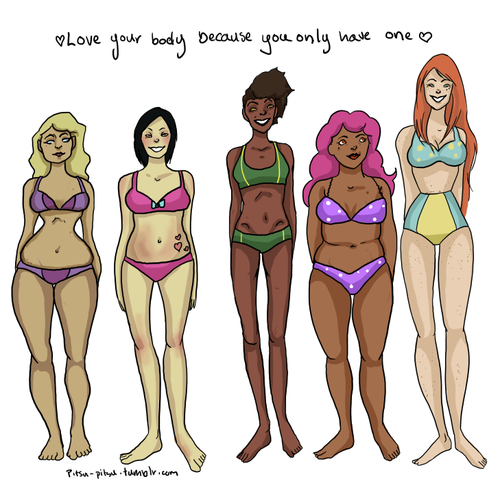Is the romanticisation of skinniness a harmless body appreciation or a dangerous ideal? Charlie discusses why we need greater body diversity in the media:
We’re all guilty of it. Wishing we had Gwyneth Paltrow’s cheekbones instead of focusing 100% of our attention on Iron Man 3, re-posting photos of knee-high socks on skinny legs on Tumblr, or even comparing our own body with those of our family members and friends.
It’s normal, right? To compare ourselves with celebrities or photoshopped magazine pictures, only seeing certain ‘perfect’ body types on TV… It’s just the way things are.
But actually it’s more than that. Take a look at the series you’re watching on Netflix. Look at the lady advertised on that new yogurt ad. Wait and see how many hateful comments a plus-size woman gets on Facebook- simply for being comfortable in her own skin. Treating a human being with more or less respect because of their body type just isn’t right, and we need to speak up loud and clear about this injustice.
The plain fact is, we don’t see enough average sized people in the media. Even teenage roles in sitcoms are usually older actors, with a lack of spot problems and no chubbiness in sight. When mental illness took over my wellbeing, I thought that all those perfect looking people on TV were mocking me, showing me what my wobbly thighs should look like.
Of course body issues aren’t just a problem for women. Men also face problems due to body idealisation. For instance, Zayn Malik has just begun to speak up about his eating disorder, and the praising of his malnourished, skinny body as he was mentally struggling. The praise people receive for losing weight is a massive issue, potentially triggering a desire for less weight or body fat, a constant striving for ‘perfection’.
Of course there are outliers. The legendary Olivia Colman is a good example of a normal sized actor as a detective in Broadchurch – or comedians such as James Corden, Amy Schumer and Miranda Hart. The Body Positive community is also bringing in a wide range of body types and ethnic minorities, encouraging people to embrace their natural body type. But there are still not enough. In my opinion, if actors or presenters of a normal weight stand out, the average dress sizes of the world are not being represented significantly.
Naomi Wolf stated that : “A culture fixated on female thinness is not an obsession about female beauty, but an obsession about female obedience”. We’re increasingly obedient to diets, to restricting our pleasure of food, and to restricting our happiness by obsessing over body types. This obsession is relevant to all genders worldwide. Society preaches dieting and weight loss as if it is a religion; forcing us to bow down to the ideal body type and sacrifice our own happiness to force ourselves into a smaller dress size. But we should never reduce our feelings of self-worth because of our body, and we do not need to give the shape of our bodies such paramount importance.
Charlie Collett
(Photo credit: http://www.hercampus.com/school/valdosta/3-steps-being-body-positive)

